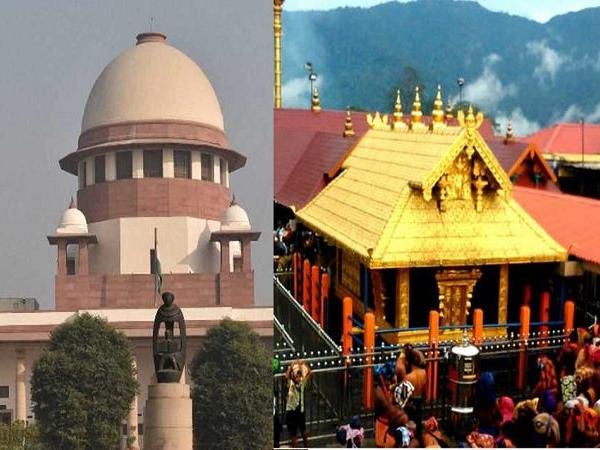In a big development, a Supreme Court bench comprising of Chief Justice Ranjan Gogoi and Justice RF Nariman, Justice AM Khanwilkar, Justice DY Chandrachud and Justice Indu Malhotra has agreed to hear the review petitions against its Sabarimala verdict in an open court on January 22. Total 49 review petitions were filed seeking revisit of the SC’s September 28 verdict allowing entry of women of all ages inside the Kerala’s famous Sabarimala temple.
The 5-judge bench headed by Chief Justice of India Ranjan Gogoi which took up the review pleas today however said there will be no stay of the September 28 judgment lifting age restrictions on entry of women to Sabarimala temple @IndianExpress
— Ananthakrishnan G (@axidentaljourno) November 13, 2018
On October 9, the apex court had declined an urgent hearing on the review petition filed by an association which had maintained that the five judge-judge Constitution bench’s verdict by 4:1 ratio is absolutely untenable and irrational.
Later, the Supreme Court had said that it would consider the review petitions on November 13. One of the petitioners- National Ayyappa Devotees Association (NADA) – had said that “the notion that the judgment under review is revolutionary, one which removes the stigma or the concept of dirt or pollution associated with menstruation, is unfounded. It is a judgment welcomed by hypocrites who were aspiring for media headlines. On the merits of the case, as well, the said judgment is absolutely untenable and irrational, if not perverse”.
Here is the SC order on Sabarimala @IndianExpress pic.twitter.com/9FH2psrF0S
— Ananthakrishnan G (@axidentaljourno) November 13, 2018
The review petitions rely heavily on the judgement of sole dissenter in Sabarimala verdict- Indu Malhotra. Her Ladyship observed, “What constitutes essential religious practice is for the religious community to decide, not for the court. India is a diverse country. Constitutional morality would allow all to practice their beliefs. The court should not interfere unless if there is any aggrieved person from that section or religion.” Justice Indu Malhotra also observed, “Religious practices can’t solely be tested on the basis of the right to equality. It’s up to the worshippers, not the court to decide what’s religion’s essential practice.” The review petitions also maintained the same thing. According to the live law, the review petitions also maintained that the apex court erred in entertaining the PIL without examining the locus standi of the petitioner. It stated that no woman devotee of Bhagwan Ayyappa would enter into Sabarimala Temple by violating the tradition of age limit, and hence the court erred in adjudicating the issue on a petition submitted by a party who are completely illiterate about the customs and traditions of the temple.
The review petitioners further said that the SC was wrong in its conclusion that the basis of prohibition was physiological nature of women. They said that rationale behind the practice is rooted in the “naishtika brahmachari” character of the deity, as per which the deity cannot be in the presence of women the bracket of 10-50 age group (having reproductive capabilities). Therefore the practice is not derogatory to the dignity of women.
Sabarimala is not just any other temple. It has its own rituals and customs. In Hinduism there are different rituals, customs and traditions for different gods and goddesses. It is not an Abrahmic religion with a monotheistic outlook in which faith is defined in rigid terms and sacred and profane is clearly outlined. It has diversity and differences, and the strength of Hinduism lies in accepting the differences and celebrating it. Celebrating and respecting diversity is not inequality or discrimination, and not all exclusion is discrimination.
After the apex court of India allowed the entry of women of all ages into the Kerala’s famous Sabariamala Temple, the protests ensued all over the state. The verdict has led to unprecedented Hindu unity in Kerala. The cabal described the verdict as giant step towards gender equality, a major blow to patriarchy, women’s liberation etc. Interestingly enough the verdict which has been considered as pro-women is being vehemently opposed by the women of the state. It is the women devotees of Bhagwan in Kerala who are leading the protest against the verdict of the Supreme Court on Sabarimala. In their pursuit to save their tradition, the devotees of Bhagwan Ayyappa refused to bow down in front of oppressive regime of Kerala government which has been trying to impose SC’s verdict by hook or crook as it is against the sentiments and traditions of Hindus. With the Supreme Court accepting the review petitions, the crores of Ayyappa devotees have achieved a major victory in their struggle to save their tradition and custom. Hope that SC would reconsider its verdict and would do the justice to the sentiments of crores of Ayyappa devotees.
